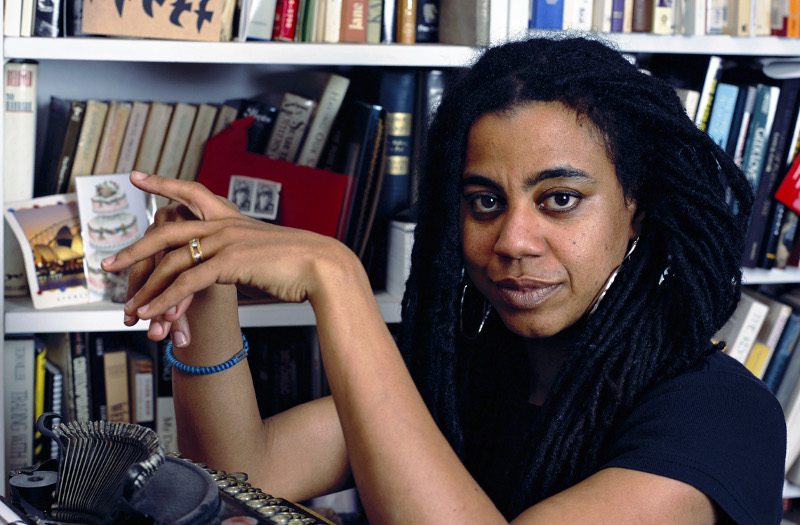Suzan-Lori Parks is an American playwright, screenwriter, musician and novelist. Among her accomplishments, she is the first African American woman to win the Pulitzer Prize for Drama, with her play Topdog/Underdog in 2002. She’s been named among Time magazine’s “100 Innovators for the Next Wave”, is a MacArthur “Genius” Award recipient, and in 2015 was awarded the prestigious Gish Prize for Excellence in the Arts.
Born in Fort Knox, Kentucky, Parks grew up in a military family with two siblings. She enjoyed writing poems and songs growing up, and created a newspaper with her brother, called the Daily Daily. She attended middle and high school in West Germany because her father, a career officer, was stationed there. She experienced what it was like to be neither black nor white, just foreign. When her family moved back to the United States, she continued her education in Kentucky, Texas, California, North Carolina, Maryland, and Vermont.
Parks was discouraged from studying literature in high school due to a teacher criticizing her spelling. Her initial interest was in chemistry, but she soon found herself gravitating back to writing after reading Virginia Woolf’s To the Lighthouse. While her father was stationed at Aberdeen Proving Ground in Maryland, she graduated from high school at The John Carroll School in 1981. She went on to graduate from Mount Holyoke College with a B.A. in English and German literature. She was a member of Phi Beta Kappa and studied under James Baldwin, who encouraged her to become a playwright. He describes Parks as “an utterly astounding and beautiful creature who may become one of the most valuable artists of our time.” In order to better understand the stage, she studied acting at Drama Studio London for a year.
Father Comes Home from the Wars, Parts 1, 2 & 3 takes place during the American Civil War, and was awarded the Horton Foote Prize, the Edward M. Kennedy Prize for Drama as well as being a 2015 Pulitzer Prize Finalist. She wrote this play based on her own experiences with her father going to the wars and returning home. She says of her father, “Dad was in the military, he joined because it was one of the few places a man of African American descent could get a fair shake. He thought he would be compensated better.”
She explains that if you look closely at the present you will see the past. This play is written using today’s language because history is today, old stories are happening over and over again. The language, music, gestures, and costumes are a mixture of then and now. She notes that the music is a vertical plot development, as opposed to a horizontal (from a to b, typical in most plays); it deepens the moment. Where is the writer in the play? Parks most identifies with the dog.
Parks’ project 365 Days/365 Plays (where she wrote a play a day for an entire year, just for fun) was produced in over 700 theaters worldwide, creating one of the largest grassroots collaborations in theater history. She called friends and their friends called friends, they got together and performed at different times all over the world. This was her way of saying thanks for winning the Pulitzer Prize.
Her other plays include: The Book of Grace; Unchain My Heart: The Ray Charles Musical; In the Blood (2000 Pulitzer Prize finalist); Venus (1996 OBIE Award); The Death of the Last Black Man in the Whole Entire World; Imperceptible Mutabilities in the Third Kingdom (1990 OBIE Award, Best New American Play); The America Play and Fucking A. Her adaptation of The Gershwins’ Porgy and Bess won the 2012 Tony Award for Best Revival of a Musical.
See Father Comes Home From The Wars, Parts 1, 2 & 3 at CCBC Essex, F. Scott Black Theatre on March 14 at 11:10 a.m., March 15 & 16 at 7 p.m., March 17 at 3 p.m. (ASL Interpreted), March 18 at 10 a.m. Purchase tickets online or call the Box Office at 443-840-ARTS.

